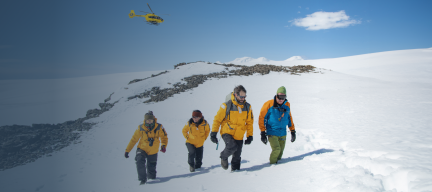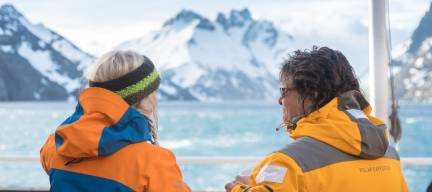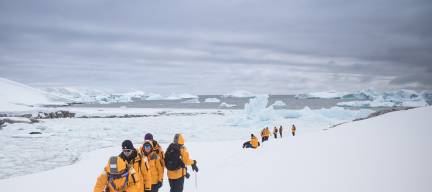For many travelers, the polar regions are more than just a remote destination—they are a landscape for introspection. Time spent on polar expeditions offers unique psychological experiences that few other environments can replicate. The combination of vast, untouched wilderness, extreme conditions, and extended periods of solitude allows participants to confront themselves, explore personal boundaries, and gain unexpected insights.
Researchers and psychologists have long noted that social isolation in controlled environments can promote reflection, mindfulness, and personal growth. In the Arctic or Antarctic, these effects are amplified by the stark beauty of icebergs, glaciers, and snowfields that stretch to the horizon. Travelers on Crossing the Circle Southern Expedition often report moments of profound clarity, where the quiet and isolation create space to process experiences, set goals, or simply appreciate the present. Quark Expeditions provides a framework that balances safety with this transformative solitude, giving participants both structure and freedom. For those interested in exploring the Arctic, our Arctic journeys are designed to offer similar immersive experiences in the northern polar regions.

The Mental Benefits of Isolation
Extended periods of isolation in polar regions can have surprising psychological benefits. Without the constant noise and distractions of daily life, travelers often experience reduced stress levels and heightened focus. Many expedition participants describe a sense of mental clarity that is difficult to achieve in busy urban settings. Journaling and travel diaries are particularly effective during these trips, allowing participants to document thoughts, track emotional responses, and reflect on personal growth.
In addition, the repetitive yet beautiful environment of the poles encourages mindfulness. Watching icebergs drift past, listening to the quiet ripple of glacial waters, or observing wildlife in their natural habitat can create a meditative state. This mindful attention to the present moment is a key factor in improving emotional resilience and overall mental well-being.

Self-Reflection in Extreme Environments
One of the most cited effects of polar expeditions is the opportunity for profound self-reflection. When removed from familiar social circles and routine tasks, travelers have more time to focus on themselves. Many return from expeditions with a renewed sense of priorities, clearer personal goals, and a deeper understanding of their own resilience.
Researchers studying isolation in extreme conditions, including polar environments, suggest that such experiences can enhance emotional regulation, empathy, and problem-solving skills. The combination of solitude and shared adventure—with fellow travelers on Zodiac trips or guided hikes—creates a unique balance between introspection and social interaction.

Travel Diaries: Capturing the Inner Journey
Documenting the journey is a vital component of the psychological benefits of polar travel. Keeping a travel diary allows participants to capture both external observations and internal reflections. These journals often become treasured artifacts, detailing not just the spectacular sights of icebergs or glaciers, but also the thoughts, emotions, and lessons learned during quiet moments of self-exploration.
Many travelers note that writing or sketching while observing polar landscapes enhances their engagement with the environment. This form of active reflection encourages a deeper connection to the natural world and promotes long-term mental well-being.
Balancing Isolation with Social Interaction
While solitude is beneficial, structured social interaction during polar expeditions ensures that participants maintain a healthy emotional balance. On the Under the Northern Lights: Exploring Iceland & East Greenland, guests share stories around the dining table or during guided excursions, providing moments of connection that complement the reflective periods. This balance between isolation and community contributes to a well-rounded psychological experience.
Travelers often report that small group discussions, informal gatherings, and shared adventures enhance their understanding of self and others. Observing the vastness of the polar environment alongside fellow explorers fosters a sense of shared humility and perspective, reinforcing both personal insight and collective awareness.
Long-Term Benefits of Polar Reflection
The effects of isolation during polar travel often extend well beyond the expedition itself. Many participants find they are better equipped to handle stress, make thoughtful decisions, and approach life with renewed focus after returning home. The combination of mindfulness, travel diaries, and structured reflection helps translate these experiences into long-lasting personal growth.
By choosing expert-led trips with Quark Expeditions, travelers gain access not only to spectacular Arctic and Antarctic landscapes but also to thoughtfully designed itineraries that facilitate both adventure and introspection. More details on Antarctic journeys can be found at Quark Expeditions Antarctic trips.

Final Thoughts
Polar regions are not only physically remote—they offer a psychological distance from everyday life that allows travelers to pause, reflect, and reconnect with themselves. Through carefully designed polar expeditions, periods of social isolation, and the practice of keeping travel diaries, participants gain insights into their own resilience, priorities, and capacity for mindfulness. The mental and emotional benefits of these experiences are as profound as the landscapes themselves, making polar exploration a transformative journey for body, mind, and spirit.









